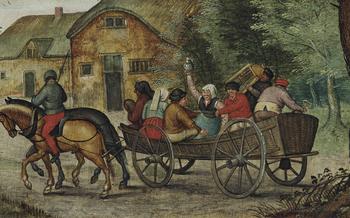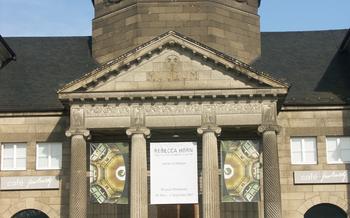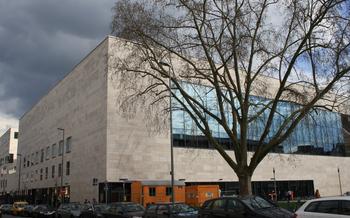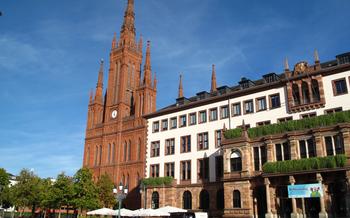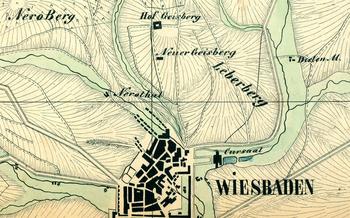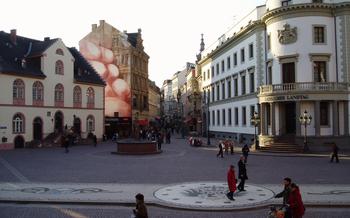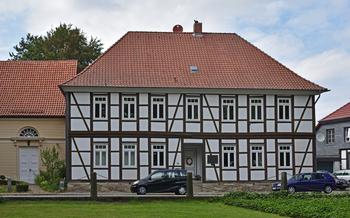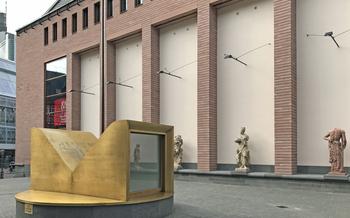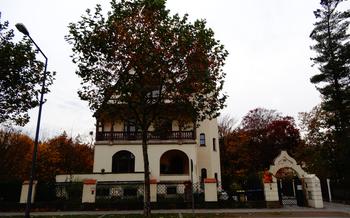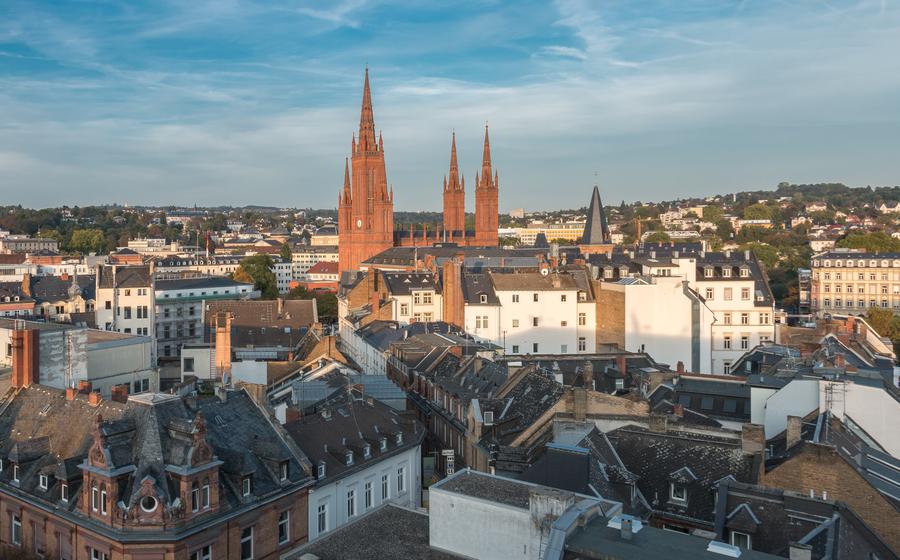
The Apothecary Museum
- Step Back in Time: The Museum's Historic Building
- Interactive Exhibits: Engaging with the Past
- Pharmacy Through the Ages: A Visual Journey
- Herbal Remedies and Natural Cures
- The Art of Alchemy: Transforming Elements
- Medical Marvels: Innovations and Discoveries
- The Apothecary's Garden: A Realm of Healing Plants
- Special Exhibitions and Events: Unveiling Hidden Stories
- Educational Programs and Workshops: Learning Beyond the Museum Walls
- Accessibility and Facilities: Ensuring a Welcoming Experience
- Getting There and Around: Practical Transportation Tips
- Insider Tip: A Hidden Gem for History Buffs
Step Back in Time: The Museum's Historic Building
The Apothecary Museum in Wiesbaden is housed in a magnificent building that is as captivating as the exhibits it contains. Constructed in the early 18th century, the building was originally designed as a private residence for a wealthy merchant. Its elegant Baroque architecture, characterized by intricate carvings and elaborate embellishments, reflects the opulence of that era.
The building's location is equally significant. Situated in the heart of Wiesbaden's historic district, it stands as a testament to the city's rich cultural heritage. The narrow cobblestone streets that surround the museum transport visitors back in time, creating an enchanting atmosphere that enhances the overall experience of exploring the museum's collection.
In the early 19th century, the building underwent a transformation, transitioning from a private residence to a fully functioning pharmacy. This transformation marked the beginning of its long history as a center for pharmaceutical knowledge and innovation. The building's original features were meticulously preserved during this renovation, ensuring that its architectural integrity remained intact.
An interesting anecdote recounts how the building evolved from a bustling pharmacy to the museum it is today. In the early 20th century, as the pharmaceutical industry underwent significant changes, the pharmacy gradually lost its commercial viability. However, recognizing its historical and cultural significance, a group of dedicated individuals came together to establish the Apothecary Museum within its walls. Through their efforts, the building was transformed into a repository of pharmaceutical history, preserving the legacy of this once-thriving pharmacy for future generations.
Interactive Exhibits: Engaging with the Past
The Apothecary Museum in Wiesbaden offers a range of interactive exhibits that allow visitors to engage with the history of pharmacy and medicine in a fun and hands-on way. Multimedia presentations and audio guides provide informative insights into the exhibits, while interactive displays and hands-on activities invite visitors to learn through play and experimentation.
One memorable interactive experience at the museum is the "Virtual Apothecary." This exhibit allows visitors to step into the shoes of an apothecary from the past and create their own virtual prescriptions using ingredients from the museum's collection. Visitors can follow the process of compounding a medication, from weighing and measuring ingredients to mixing and labeling the final product.
Another popular interactive exhibit is the "Medicine Cabinet of Curiosities." This exhibit features a collection of unusual and bizarre medical artifacts from the past, such as a trepanning tool, a leech jar, and a collection of ancient surgical instruments. Visitors can learn about the history and use of these strange and wonderful objects and even try their hand at performing a virtual surgery using a simulated operating table.
These interactive exhibits make the Apothecary Museum a great place for visitors of all ages to learn about the history of pharmacy and medicine in a fun and engaging way.
Pharmacy Through the Ages: A Visual Journey
Step into the Apothecary Museum's captivating exhibits, where you'll embark on a visual journey through the evolution of pharmaceutical practices and techniques. Witness the progression of drug manufacturing and dispensing as you explore displays of historic pharmacy equipment and tools. Discover the ingenuity of ancient apothecaries as you uncover the secrets behind their remarkable remedies.
In one corner of the museum, you'll find a replica of a medieval apothecary shop, complete with wooden shelves lined with ceramic jars filled with herbs, spices, and other natural ingredients. Learn about the painstaking methods used to extract healing compounds from plants and the intricate processes involved in creating medicines by hand.
As you move through the exhibits, marvel at the intricate designs and craftsmanship of antique mortars and pestles, distillation apparatus, and other tools that were essential to the apothecaries of the past. Discover the fascinating history of drug manufacturing, from the alchemists' quest for the philosopher's stone to the development of modern pharmaceutical techniques.
A particularly captivating display showcases a collection of ancient Egyptian medical papyri. These fragile documents, inscribed with hieroglyphs, offer a glimpse into the medical practices of one of the world's oldest civilizations. Learn about the remedies they used to treat common ailments, their understanding of human anatomy, and their belief in the power of magic and religion in healing.
But the museum doesn't just focus on the distant past. It also sheds light on the more recent history of pharmacy, showcasing the advancements made during the Industrial Revolution and the development of modern pharmaceuticals. Interactive exhibits allow you to explore the science behind drug discovery, the testing and approval process, and the role of clinical trials in ensuring the safety and efficacy of medications.
Through its engaging displays and informative exhibits, the Apothecary Museum offers a comprehensive and visually stunning journey through the fascinating history of pharmacy. Whether you're a history buff, a science enthusiast, or simply someone curious about the world of medicine, this museum is sure to captivate and inspire.
Herbal Remedies and Natural Cures
The Apothecary Museum in Wiesbaden delves into the fascinating world of herbal remedies and natural cures, showcasing the rich history and traditions of plant-based medicine. Interactive exhibits invite visitors to explore the medicinal properties of various plants, with hands-on activities and demonstrations that bring the healing power of nature to life. Historic recipes and displays of traditional herbal remedies provide a glimpse into the wisdom of ancient healers. Discover the secrets of herbal tinctures, ointments, and teas, and learn about the plants that have been used for centuries to treat a wide range of ailments.
In a personal anecdote, I recall a memorable experience with a herbal remedy at the museum. During a guided tour, I was introduced to the healing properties of St. John's wort, a plant known for its antidepressant and anti-inflammatory effects. Intrigued, I decided to try a St. John's wort tea, and to my surprise, it had a noticeable impact on my mood and energy levels. This experience reinforced my appreciation for the power of herbal remedies and the wisdom of traditional medicine.
The Art of Alchemy: Transforming Elements
The Apothecary Museum in Wiesbaden offers a fascinating glimpse into the ancient practice of alchemy, a precursor to modern chemistry. Visitors can explore interactive exhibits that shed light on the alchemical process, including the search for the philosopher's stone and the transmutation of metals.
On display are a variety of alchemical tools and equipment, such as alembics, crucibles, and mortars and pestles. These artifacts provide insight into the methods and techniques used by alchemists in their quest to unlock the secrets of nature.
The museum also features explanations of alchemical symbols and their meanings, allowing visitors to delve deeper into the language and symbolism of this enigmatic practice.
Anecdote: A Tale of a Legendary Alchemist Who Visited Wiesbaden
During the 16th century, Wiesbaden was visited by the legendary alchemist Paracelsus, who is considered one of the fathers of modern medicine. Paracelsus was drawn to the city's rich mineral springs, which he believed possessed healing properties.
It is said that Paracelsus spent many hours in the Apothecary Museum, studying the works of the ancient alchemists and experimenting with various chemical compounds. His time in Wiesbaden is believed to have influenced his later work on medical alchemy, which focused on the use of chemical substances to treat diseases.
Medical Marvels: Innovations and Discoveries
The Apothecary Museum in Wiesbaden not only delves into the history of pharmacy but also showcases groundbreaking medical discoveries and inventions that have shaped the world of medicine. Interactive exhibits allow visitors to engage with the stories of famous physicians and scientists associated with Wiesbaden, shedding light on their groundbreaking contributions to the field. One such exhibit highlights a little-known medical breakthrough that occurred right in Wiesbaden.
In the early 19th century, a local physician named Dr. Wilhelm Fresenius developed a revolutionary new method for treating cholera, a deadly disease that had claimed countless lives across Europe. Through meticulous research and experimentation, Dr. Fresenius discovered that administering a combination of fluids and electrolytes could effectively combat the severe dehydration caused by cholera. His groundbreaking discovery revolutionized the treatment of cholera and significantly reduced mortality rates. The Apothecary Museum proudly displays the original equipment used by Dr. Fresenius, allowing visitors to trace the history of this life-saving innovation.
The Apothecary's Garden: A Realm of Healing Plants
Step into the Apothecary's Garden, a tranquil oasis nestled within the museum complex. This verdant sanctuary showcases a diverse collection of medicinal plants, each with its own unique healing properties. Guided tours led by knowledgeable botanists provide insights into the fascinating world of herbal medicine. Visitors can learn about the traditional uses of various plants, their cultivation, and their role in modern pharmaceuticals.
Hands-on activities, such as plant identification workshops and interactive exhibits, allow visitors to engage with the garden's botanical wonders. Whether you're an aspiring herbalist or simply curious about the healing power of nature, the Apothecary's Garden offers a delightful and educational experience.
In a personal anecdote, I recall a serendipitous encounter with a rare and elusive medicinal plant during a guided tour. The botanist's enthusiasm and knowledge were contagious, sparking a newfound appreciation for the intricate relationship between plants and human health. The Apothecary's Garden is a treasure trove of botanical wonders, waiting to be explored and discovered.
Special Exhibitions and Events: Unveiling Hidden Stories
Beyond the permanent exhibits, the Apothecary Museum in Wiesbaden hosts a variety of temporary exhibitions and special events that delve into specific aspects of pharmacy and medicine. These exhibitions often showcase rare artifacts, historical documents, and innovative research findings, offering visitors a deeper understanding of the field's rich history and ongoing evolution.
The curatorial team at the museum carefully selects these temporary exhibitions, ensuring that they align with the museum's mission and provide a diverse range of topics for visitors to explore. From the history of herbal medicine to the latest advancements in drug development, these exhibitions offer something for everyone interested in the world of pharmacy and healthcare.
Special events, such as lectures, workshops, and guided tours, are also organized regularly to complement the temporary exhibitions. These events provide opportunities for visitors to engage with experts, researchers, and curators, gaining insights into the latest developments in the field and the behind-the-scenes work of the museum.
One memorable special event that I attended at the Apothecary Museum was a lecture on the history of medical instruments. The speaker, a renowned medical historian, shared fascinating stories about the evolution of surgical tools, anesthesia, and other medical devices. The lecture was accompanied by a display of antique medical instruments, allowing us to see firsthand the remarkable advancements that have been made in the field.
Whether you are a history buff, a medical professional, or simply someone with a curious mind, the special exhibitions and events at the Apothecary Museum in Wiesbaden offer a unique opportunity to explore the hidden stories of pharmacy and medicine. Be sure to check the museum's website or social media pages for upcoming events and exhibitions to enhance your visit.
Educational Programs and Workshops: Learning Beyond the Museum Walls
The Apothecary Museum offers a range of educational programs and workshops that cater to diverse audiences, from school groups to adults with a keen interest in pharmacy and medicine. These programs are designed to extend the learning experience beyond the museum's walls and foster a deeper understanding of the fascinating world of pharmaceuticals.
School groups can embark on guided tours tailored to their curriculum, exploring the museum's exhibits and engaging in hands-on activities that bring the history of pharmacy to life. Interactive workshops on topics such as plant identification, drug manufacturing, and medical advancements provide students with a unique opportunity to learn through play and experimentation.
Adults can participate in lectures, seminars, and workshops that delve into specific aspects of pharmacy and medicine. Renowned experts and researchers share their knowledge on topics ranging from the history of alchemy to the latest medical discoveries. These programs offer a platform for engaging discussions and the exchange of ideas, fostering a sense of community among participants.
One of the museum's most popular educational programs is the "Science Saturdays" series, held on the first Saturday of every month. These events feature interactive demonstrations, hands-on activities, and talks by experts, providing visitors with an immersive and entertaining learning experience.
A particularly unique educational program offered by the museum is the "Pharmacy Apprentice" program. This program allows participants to experience the life of a pharmacist in the 19th century. Dressed in period costumes, participants learn about the daily tasks and responsibilities of a pharmacist, including preparing medicines, dispensing prescriptions, and interacting with customers. The program offers a fascinating glimpse into the history of pharmacy and provides participants with a hands-on understanding of the profession.
Accessibility and Facilities: Ensuring a Welcoming Experience
The Apothecary Museum is committed to creating an inclusive and welcoming environment for all visitors. The museum is wheelchair accessible, with ramps and elevators providing easy access to all floors. Guided tours in multiple languages are available upon request, ensuring that visitors from all backgrounds can enjoy the museum's exhibits.
For the convenience of visitors, the museum also offers a range of amenities. A well-stocked gift shop provides a variety of souvenirs and educational materials related to the history of pharmacy and medicine. A cozy café offers a place to relax and enjoy a light meal or snack. Restrooms are conveniently located throughout the museum.
One heartwarming anecdote that exemplifies the museum's dedication to accessibility comes from a visitor who was particularly touched by the museum's efforts. The visitor, a woman in a wheelchair, expressed her gratitude to the museum staff for their assistance and for making her visit so enjoyable. She noted that she had often felt excluded from cultural attractions due to accessibility issues, but that her experience at the Apothecary Museum had been nothing but positive. The museum's commitment to inclusivity ensures that all visitors can have a meaningful and enriching experience.
Getting There and Around: Practical Transportation Tips
Reaching the Apothecary Museum is a breeze, whether you're arriving by public transport or car. Hop on the convenient bus lines 1, 4, 6, 8, or 14, and alight at the "Markt" stop, just a short stroll from the museum's doorstep. If you prefer the flexibility of driving, there are several parking options nearby, including the "Marktgarage" and "Luisenplatz" car parks.
Once you've arrived, you can easily explore the museum and its surroundings on foot. Wiesbaden's charming city center is just a stone's throw away, inviting you to extend your visit with a leisurely stroll through its historic streets. Take advantage of the opportunity to visit other attractions in the area, such as the majestic Wiesbaden Kurhaus or the elegant Schlossplatz.
Insider tip: For a unique perspective of the city, consider taking a scenic boat trip on the River Rhine, which offers breathtaking views of Wiesbaden's landmarks.
Insider Tip: A Hidden Gem for History Buffs
For the truly curious and adventurous, the Apothecary Museum holds a hidden gem that will transport you even further back in time. Tucked away in a secluded corner of the museum, you'll find a secret room that houses a collection of ancient medical manuscripts and rare pharmaceutical instruments. These precious artifacts provide a glimpse into the fascinating world of early medicine and alchemy.
To uncover this hidden gem, simply ask a museum staff member for directions to the "Secret Room of Medical Curiosities." Once inside, you'll be surrounded by centuries-old books filled with handwritten recipes and diagrams, as well as strange and wonderful tools that were once used by apothecaries and alchemists.
As you explore this hidden treasure trove, you'll feel like a true Indiana Jones of pharmaceutical history. Don't miss the chance to immerse yourself in this captivating world and discover the secrets that lie within.
